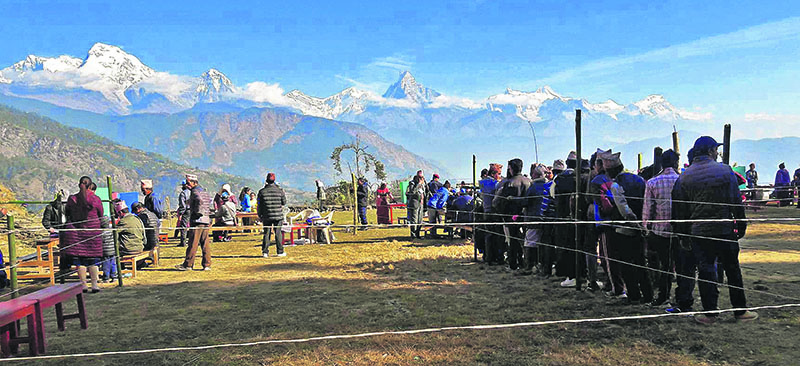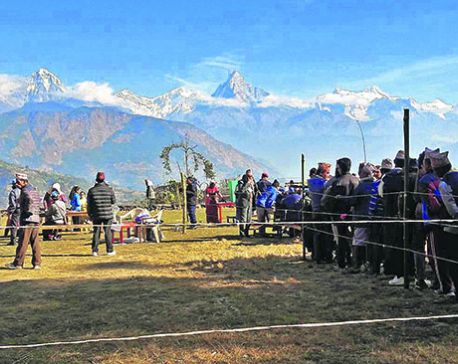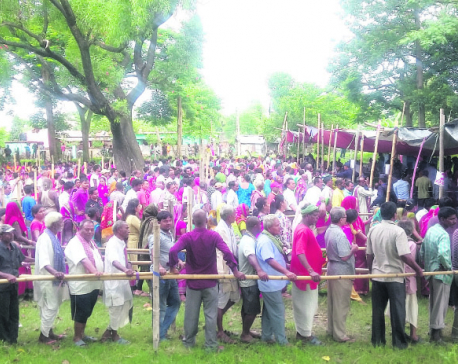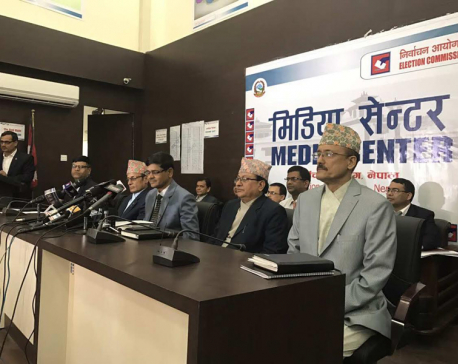
OR

KATMANDU, Dec 8: The final round of parliamentary and provincial assembly elections concluded in 45 districts of the country on Thursday, wrapping up the election season that began in May with the local elections as mandated by the constitution.
Thursday's polls witnessed a 67 percent voter turnout, with a total eligible voter population of 12.2 million. The elderly and the physically challenged also went to their respective polling centers to exercise their democratic right. Gulmi witnessed the highest voter turnout (71 percent) among the 45 districts where the second phase polls were conducted.
The election season started from May with the local polls, the final phase of which concluded in mid-September. The government had decided to hold the local polls in three phases, citing disagreement among major stakeholders, mainly over the contents of the constitution.
With the local polls out of the way, the first round of elections to parliament and the provincial assemblies was conducted in 32 districts last month.
“The EC believes this election has contributed to implementing the constitution and ending the transition in the real sense,” Chief Election Commissioner Ayodhee Prasad Yadav said Thursday evening at a function organised to brief reporters about the final round of polls.
At the function, CEC Yadav said the poll was conducted peacefully in all district, except for two polling centers in Arghakhaachi. Voting at the two polling centers at Mathura Secondary School at Neta in Sandhikharka-5 was canceled after parties disputed the authenticity of ballot papers. The election office has been instructed to hold discussions with the contesting parties and conduct a re-election at the earliest.
CEC Yadav said the polls were largely peaceful and voter turnout was higher than in the first phase. Voter turnout in first phase parliamentary and provincial elections was recorded at 65 percent. However, voter turnout is less compared to other recent elections. The voter turnout in the recently concluded local elections was 74.16 percent. It was 79 percent in the 2013 Constituent Assembly elections.
EC officials, however, said the voter turnout figure could go up once they compile final details from the field.
Braving the cold, bomb threats by poll-opposed groups and various other odds, voters reached the polling centers even before the poll centers opened.
Poll observers also said the elections were largely peaceful, with just a few sporadic clashes, and voter turnout was satisfactory. Except for a few minor clashes between cadres of rival parties, no serious poll violence was reported.
“Voter turnout today is not bad. The turnout figure could go up, but the poll timing caused a little difficulty. Voters in some hill and mountain regions have already left their villages for work in neighboring countries, or to avoid the cold,” said former acting chief election commissioner Dolakh Bahadur Gurung, adding, “Voters in the Tarai districts were busy with the harvest”.
Ex-acting EC chief Gurung, who monitored the polls in the southern plains including Chitwan, applauded the election body for making all the elections possible within a short span. “This is a milestone in implementing the constitution and bringing democracy back on track,” he said.
Immediately after completion of the voting, poll officers started transporting the ballot boxes to the district headquarters.
Vote counting for the second phase polls will begin once all the ballot boxes are in and an agreement is reached with the contesting parties.
Vote counting for the first phase elections has already started in all 32 districts. The EC expects to issue the poll results for the First-Past-The-Post system within four days of starting the count, and the results of the Proportional Representation category within a week.
Man of Elections
Holding three sets of elections within a period of 10 months was a herculean task. When the date of local polls was announced by the Pushpa Kamal Dahal-led government in the last week of February, many were skeptical the polls would take place within 10 months.
Uncertainty over poll prospects was rife as the parties were sharply polarized over the constitution. The parties were engaged in a blame game and the Madhes-centric parties were threatening a poll boycott if the constitution was not amended first. On the other hand, the main opposition CPN-UML was mounting pressure on the government to conduct the elections without further delay.
Basic infrastructure for conducting the polls--electoral laws and administrative arrangements--were not yet cleared. Poll logistics needed to be purchased form aboard. The government was shaky because the parties had a deal to take turns heading it. Fear was rife that the ruling parties could form or topple the government.
Amid uncertainties over the polls, the Dahal government on February 20 announced May 14 as the date for local polls across the country. While preparations were underway for local polls taking place after a gap of two decades, the government announced polls in Provinces 3, 4 and 6 in a first phase, and in Provinces 1, 2, 5 and 7 in the second phase
The government's flip-flops on poll dates put the election body in a fix and many questioned whether all three sets of polls would be conducted within the narrow constitutional deadline of January 21 2018.
The EC moved ahead in accordance with the government decision. The government delayed local elections yet again, citing reservations by the Madhes-based parties and set September 18 as the date for Province 2 elections.
Soon after holding the local polls successfully, the election body started work on parliamentary and provincial elections. Various factors like the weather and legal and administrative hurdles have posed serious challenges to the crucial polls. The election commissioners, and Chief Election Commissioner Ayodhee Prasad Yadav, in particular, faced up to the challenges.
Yadav and the other election commissioners were criticized for various things. The invalid vote was the highest ever in Nepal's election history. The election body has not yet released the integrated invalid vote percentage. Many questioned the neutrality of the election body when it decided to conduct re-elections in Chitwan Metropolitan City where ballots were torn up by representatives of the Maoist Center candidate..
The election commissioners' decision to purchase luxury cars also raised questions over the integrity of the commissioners. They are likewise accused of misusing state funds for housing facilities and allowances.
Despite these criticisms and shortcomings, the EC has handled the elections within the constitutionally mandated deadline.
You May Like This

67% voter turnout in phase II polls
KATHMANDU, Dec 8: The final round of parliamentary and provincial assembly elections concluded in 45 districts of the country on Thursday,... Read More...

70.5 pc voter turnout in phase 2 local polls
KATHMANDU, June 28:The second round local elections were conducted enthusiastically on Wednesday in the 334 local units of Provinces 1,... Read More...

2nd phase local polls conclude peacefully, with 70.5 pc voter turnout
KATHMANDU, June 28: The vote casting in the second phase of local elections has concluded in a peaceful manner on... Read More...





Just In
- MoHP cautions docs working in govt hospitals not to work in private ones
- Over 400,000 tourists visited Mustang by road last year
- 19 hydropower projects to be showcased at investment summit
- Global oil and gold prices surge as Israel retaliates against Iran
- Sajha Yatayat cancels CEO appointment process for lack of candidates
- Govt padlocks Nepal Scouts’ property illegally occupied by NC lawmaker Deepak Khadka
- FWEAN meets with President Paudel to solicit support for women entrepreneurship
- Koshi provincial assembly passes resolution motion calling for special session by majority votes






_20220508065243.jpg)






Leave A Comment